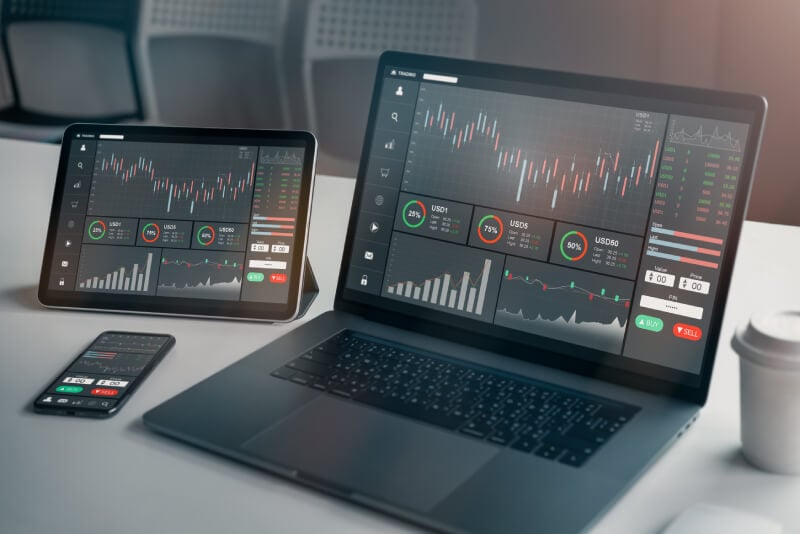There is no simple way to conclude which is better to invest in between Forex and stocks. Selecting the right financial market or instrument to invest in should consider several important factors, including:
- Your overall trading or investment goals
- Your risk tolerance
- Your trading personality type
- Your trading style
Forex markets appeal to most traders because of the high leverage, 24/5 trading opportunities, and high liquidity that is available to them. On the other hand, stocks (or blue-chip stocks) are stocks of financially stable and well-established companies. Investing in these stocks is able to generate good income and pay dividends. Stocks are usually regarded as less volatile and provide steadier growth than other forms of investments.
When comparing which is better between stocks and Forex to invest in, you should consider specific elements like market operating hours, leverage, and volatility.
In general, investing in stocks is better for investors that are looking to buy and hold them for the long term, while highly active traders prefer trading forex currency pairs.
The bottom line: if your investment style is buy-and-hold for long-term positions, then investing in stocks is a better choice for you. Stocks are more stable, better regulated, and can offer large returns in the long term.

On the other hand, if you have a quick-fire trading style and your goal is to make frequent but small profits from market movements using short-term tactics, then investing in Forex is a better option for you than stocks. They are more volatile, and you have a higher chance of making short-term profits.
While they vary in level of risk, investors and traders can make money by investing in both Forex and stocks. They require different levels of patience and trading strategies.
Stocks versus Forex Trading – What You Need to Know
Overview
The currency market and the stock market are two of the most popular financial marketplaces in the world to trade in. This is owing to their historical volume, volatility, and the abundance of instructional materials available to both FX and stock traders.
It might be tough to decide which assets to purchase and sell, spread bet on, or trade CFDs on. Trading stocks and forex are both popular among different sorts of traders, based on their personality, amount of expertise, and desired trading speed. This essay delves into the dispute over forex versus stocks, focusing on the key contrasts between forex and stock trading.
The foreign exchange market is the world’s largest and most liquid financial market, with apparently an infinite number of major, minor, and exotic currency pairings to trade.
Pips can be used by forex traders to watch price changes in order to assess whether the market is trending up or down. Among the most popular main currency pairings for forex trading are EUR/USD, GBP/USD, and USD/JPY.
Traders can bet on the value of blue-chip stocks and penny stocks, which are both popular assets with opposing original values. Some of the most promising stocks to trade are those of well-known corporations with huge market capitalisations, such as Microsoft, Apple, and Amazon. If you’re ready to take a chance on a speculative investment, penny stocks can pay off in the long run. Trading penny stocks is the premise behind the highly popular film The Wolf of Wall Street.
Differences between Stock Trading and Forex Trading
Difference #1 – Trading hours
The currency market and the stock market have different trading hours. Due to time zone overlap, the FX market is open 24 hours a day, 5 days a week. This is one of the benefits of forex trading over stock trading. On the other hand, depending on the area and exchange, there is a predetermined daily timetable for stock market trading hours.

For example, the London Stock Exchange (LSE) is open from 08.00 to 16.30, but the central FX market is open from 08.00 to 16.00, with both the New York and Tokyo sessions overlapping. Certain exchanges, particularly in the Asia-Pacific area, also close for lunch. As a result, forex trading hours are far more flexible than stock market hours, and there is undoubtedly more time to spend trading forex. Both of these financial exchanges, however, are closed on weekends.
Difference # 2 – Liquidity and volatility
Market volatility is a common issue in the forex versus stock discussion. This tracks price movements in the markets, which may assist traders make gains if the deal is completed correctly, or loses if the trade is not executed correctly.
Forex traders, in particular, strive for high liquidity in the market, which indicates that an item may be purchased and sold quickly without significantly affecting its price. As a result, increased market volatility is more likely to benefit short-term traders. Many forex methods are designed to initiate and exit positions quickly in order to profit from tiny price swings when the market is highly turbulent.
This allows them to enter and exit transactions with pinpoint accuracy.
Long-term traders who choose a buy-and-hold strategy, on the other hand, may feel less at ease in a turbulent market. This is especially true for stock traders. Given that certain blue-chip firms are regarded for their stock market stability, traders are more inclined to establish positions with the possibility for long-term profit. As a result, because they are not searching for short-term price movements, a turbulent market would be detrimental to their trading approach. Find out more about volatility trading.
Difference #3 – Assets’ volume
The variety of assets accessible for trading is one of the most appealing aspects of FX trading. We provide forex trading on over 330 currency pairs, including major, minor, and exotic forex pairings, which is the most in the industry (for more information, read our forex trading page). Forex traders prefer to choose large currencies such as EUR/USD and GBP/USD, which are thought to be relatively stable in the forex market.
The stock market offers limitless options, but it pales in comparison to the FX transaction volume of roughly $5 billion every day. Thousands of worldwide shares in the technology, pharmaceutical, and car industries are available for trading. This category contains both blue-chip and penny stocks.
The stock market is home to some of the most prestigious worldwide indexes, including the Dow Jones Index and the S&P 500.
The amount of shares on the stock market, on the other hand, is not always regarded as an advantage over FX trading. Some traders prefer the consistency of trading a small number of top forex pairs that have continuously remained in the market over picking between current, new, and emerging potential equities to invest in.
ETF trading is a popular way of trading equities via forex. Exchange-traded funds (ETFs) are investment vehicles that maintain a portfolio of underlying assets and function similarly to stocks. This provides the trader some ownership of the underlying stock, whereas spread bets and CFDs give the trader no ownership. ETFs are an excellent product for stock traders who wish to open long-term positions in the stock market.
Difference #4 – Margin trading rates
When considering the forex market versus the stock market, commonly known as margin trading, leverage is absolutely something to consider. Opening a spread betting or CFD trading account allows traders to deposit a modest proportion of the total deal value. This provides traders with greater exposure for trading stocks and FX, as well as the possibility to multiply their gains. This can, however, have the reverse effect of magnifying losses.

In general, margin rates in the forex market start at roughly 3.3%, or a leverage equivalent of 20:1. The stock market, on the other hand, poses reduced risks of capital loss by giving margin rates as low as 20% and a leverage ratio of 5:1. Indeed, this should protect dealers from incurring larger losses if their deals fail. However, forex traders with greater expertise trading unpredictable markets and closing positions quickly may benefit from this larger leverage ratio, as the payoff will be worth the risk if successful.
Difference #5 – Trading strategies
Another significant distinction between forex and stocks is the abundance of materials and tactics developed for forex traders. As previously stated, numerous forex trading methods, such as day trading / swing trading / scalping, in an attempt to generate a profit in the short-term.
Day trading in particular, as well as swing trading stocks, may be used in various marketplaces, including the stock market.
However, concentrated techniques for stock trading are less widespread because equities are frequently traded through long-term holdings, whereas currency pairings are valued more by short-term traders in turbulent markets. The variety of materials and recommendations on how to thrive in the forex market may contribute to forex trading’s edge over stock trading.
How does credit work in Forex?
In Forex, trading credits are interest-free and termless. They work and reflect as Equity on your forex trading account. The percentage of credit can be as high as 50% of the deposit amount. Any proceeds, profits, or gains you get from credit funds will be indicated as “credit” in your financial trading account.
Is Forex riskier than stocks?
Forex is usually riskier than stocks when it comes to trading. That is because forex trading typically comes with a higher degree of leverage and fewer traders are generally interested in risk management.
On the other side of the coin, stocks are usually dependent on the health of well-established and financially stable companies.
Let’s not forget that stock investors use balance sheets, products, and other company performance indicators to predict future stock prices. Meanwhile, many external factors affect the value of currencies, including a country’s economic and geopolitical factors like conflicts, trade treaties, and elections. All these unpredictable external factors make forex trading trickier and riskier than stocks.
